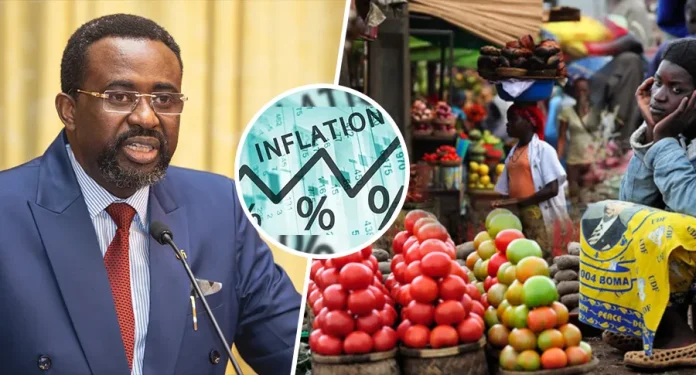Bank of Ghana’s (BoG) aggressive 350 basis point policy rate reduction could undermine inflation progress without complementary fiscal discipline measures, economist Dr. Paul Appiah Konadu has warned.
The Monetary Policy Committee slashed the policy rate by 350 basis points to 21.5 percent from 25 percent on Wednesday, September 17, 2025, citing continuous disinflation progress. The move represents the most significant rate reduction in recent memory as Ghana seeks to stimulate private sector credit growth.
Dr. Konadu, an economist at Academic City University, welcomed the rate cut as well-timed for economic expansion but cautioned that success depends on sealing fiscal loopholes that could trigger inflationary pressures.
The timing coincides with President Mahama’s Big Push Programme implementation, creating expansionary fiscal conditions that could amplify inflationary risks if not managed carefully through disciplined spending and corruption control measures.
Konadu recommended strengthening enforcement of the recently introduced 5 percent levy on foreign exchange withdrawals to discourage unnecessary dollar purchases and preserve scarce foreign currency for critical imports and external payments.
The economist expressed particular concern about proposed utility tariff increases exceeding 200 percent from Electricity Company of Ghana (ECG) and Ghana Water Company Limited. He advocated for phased implementation, suggesting initial increases of approximately 20 percent with gradual adjustments as economic conditions stabilize.
Governor Johnson Asiama’s announcement surprised markets, as economists surveyed by Bloomberg expected a more modest reduction to 22 percent. The dramatic cut reflects central bank confidence in Ghana’s disinflation trajectory and economic stability improvements.
Ghana’s inflation declined significantly from 28 percent in December 2024 to 11.5 percent in August 2025, creating space for monetary policy easing to support growth objectives while maintaining price stability commitments.
The central bank expressed confidence that inflation will reach its 8.2 percent medium-term target by end-2025, despite utility tariff pressure concerns that could complicate the disinflation process.
The policy shift aims to reduce borrowing costs for businesses seeking expansion capital, particularly benefiting small and medium enterprises that drive employment creation for Ghana’s youthful population seeking job opportunities.
Konadu emphasized that while the rate reduction supports value-added exports and private sector investment expansion, authorities must maintain vigilant fiscal oversight to prevent the erosion of recent macroeconomic gains.
The warning comes as Ghana continues economic recovery following International Monetary Fund (IMF) program implementation that restored investor confidence and stabilized currency markets after previous economic turbulence.
Business associations have welcomed the rate cut as providing much-needed credit access for expansion and job creation, particularly as companies prepare to leverage increased liquidity for productive investments.
The economist’s balanced assessment reflects broader concerns among financial analysts about balancing growth stimulation with inflation control, particularly given Ghana’s history of monetary policy challenges and fiscal discipline lapses.
Success of the policy rate reduction will depend on government’s ability to implement complementary measures including corruption control, targeted spending, and utility tariff management that support growth without reigniting inflationary pressures.
The central bank’s bold move signals confidence in Ghana’s economic transformation progress while acknowledging the need for coordinated policy responses to maintain stability during the growth acceleration phase.
Source: newsghana.com.gh











